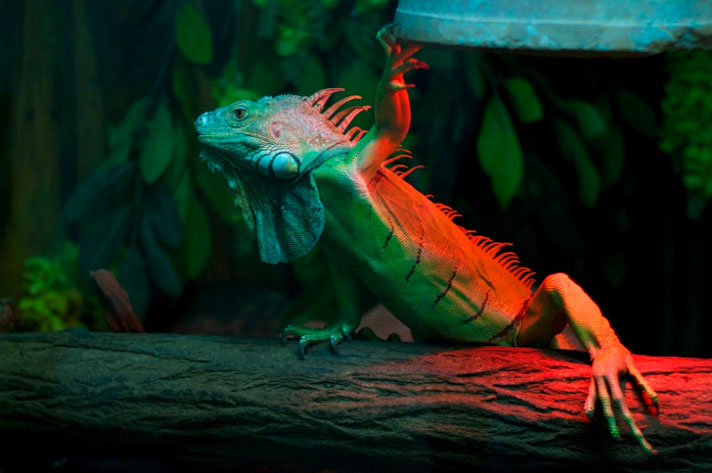Light cycles are vital for reptile health, which is why proper lighting is key for quality husbandry.
In 2017, the Nobel Peace Prize was awarded to three scientists working on circadian rhythm, or the “biological clock.” As a topic being researched continuously, more and more is being discovered about this important mechanism in animals, and specifically reptiles. Circadian rhythms are important to every living thing, and have been described in species from bacteria to humans! Reptiles have been model organisms for studies on circadian rhythm, and have provided amazing insight into this phenomena. This is also a reason why proper light cycles in captivity are vital for reptile health and wellness.

noxnorthys/Shutterstock
Light cycles are vital for reptile health, which is why proper lighting is key for quality husbandry.
Controlled by the nervous system and also known as the “biological clock,” the circadian rhythm is a way the body functions and responds to daily natural life. When conditions are constant in the wild, it helps control critical things, such as when to eat, sleep, reproduce and other bodily functions over the normal day of 24 hours. It is also very important for reptile thermoregulation.
Since reptiles cannot control their body temperatures, it's important for them to have a correct biological clock. It is a wild and natural method of time keeping that helps regulate what is normal, and what is not. This rhythm is subconscious, controlled by chemistry, and is also species specific. While natural, uncontrolled, and organic in the wild, animals in captivity rely on their keepers to give them the most naturalistic experience possible. For reptiles, this is why proper husbandry like lighting and temperature are so important for a reptile’s well being. Understanding this importance is a way to prioritize quality husbandry and reptile keeping!
Circadian rhythms, or the biological clock, are controlled by cells in the body. It is truly a way that a species perceives and survives in the world. The biological clock can influence organs from large muscle systems to photoreceptors in the eyes, which can affect individual behaviors in reptiles (and other animals). Cells can work individually or together to help reptiles detect their environments and respond to fluctuations or changes. This is especially important for reptile thermoregulation. This biological clock is also affected by the environment, and is a way to tell the animal if something is different or wrong. This helps them respond and do what they can to adapt. Overall, it is a part of the way reptiles have survived and evolved into what they are today.
In one study, it was found that lizards control their biological clocks by the cells in their eyes. This shows the importance of proper lighting and UV, which is controlled by reptile keepers when in captivity. This is important to biological research on how the brain of reptiles and vertebrates are organized. Reptiles rely on these natural cycles to control their lifestyle and for many species, are important triggers for breeding and other behaviors. Although scientific reptile research is limited on the biological clock, “the study of alternative animal models still represent a useful approach to understanding how the vertebrate circadian system is organized, and how this fascinating time-keeping system has changed throughout the evolution of vertebrates.” It is without a doubt an important part of a healthy reptile life, and with the acknowledgement of the biological clock, helps provide a better understanding to species specific husbandry and helps keepers provide the most enriching captive experience for their beloved animals.
Read the scholarly articles, here:
- https://www.ncbi.nlm.nih.gov/pubmed/11282129
- https://www.researchgate.net/publication/12051672_The_circadian_system_of_reptiles_A_multioscillatory_and_multiphotoreceptive_system



